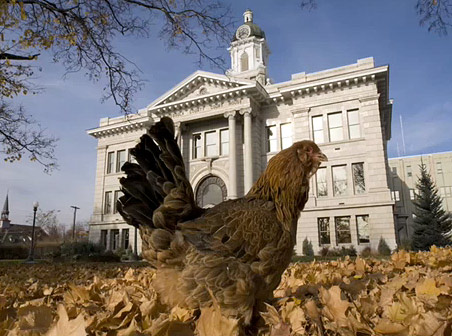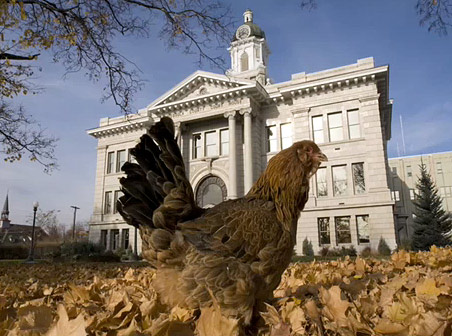 Scratchy show: Missoula, Montana fought a battle over backyard chickens, chronicled in this funny New West video (source of still, above). The city later caved in and allowed them.Photo: Anne MedleyWhen I told my roommate that I wanted to get a small flock of backyard chickens, he said OK — then added, “Of course, we’ll have to make sure it’s legal.”
Scratchy show: Missoula, Montana fought a battle over backyard chickens, chronicled in this funny New West video (source of still, above). The city later caved in and allowed them.Photo: Anne MedleyWhen I told my roommate that I wanted to get a small flock of backyard chickens, he said OK — then added, “Of course, we’ll have to make sure it’s legal.”
Uh-oh. I was pretty sure it was NOT legal. And he wasn’t willing to break the law.
We’re not alone. Around the country, chickens are gaining popularity as productive pets, and many cities (like Detroit, Iowa City, and Calgary) don’t allow them. More commonly, they allow chickens only on large properties, making the birds effectively illegal for most residents. Here’s what you can do if yours doesn’t give a flying cluck about poultry.
Don’t ask, don’t shell
Step one, of course, is to figure out whether it is legal. While there are many websites (such as Backyard Chickens and Homegrown Evolution) that list laws around the country, I have found them occasionally to be inaccurate, so I recommend you check your city’s municipal code for yourself. Your city’s code should be available online, either from a link on the city’s website or, if not, by searching on Google for “[your city name] and municipal code.” Once you’ve found the code, there are two different places to check.
First, see if there’s a section called “Animals” or something similar. Often cities choose to outlaw certain animals completely, such as ones that are nuisances (loud peacocks) or dangerous animals (venomous snakes), and those would be listed in this section. If you check here and find that chickens or roosters are not specifically outlawed, that’s good — but you have to keep reading.
Next, check the Zoning section. Typically, each zone will specify which animals are allowed in that zone. It’s this section that will likely tell you whether you can have chickens and, if so, how many. (If you’re having trouble navigating the legalese in your code, but the site offers a search function, search on terms like “chickens,” “poultry,” and “fowl.”)
If chickens aren’t legal in your city, ask around. You might find they’re tolerated by the city, so long as your neighbors don’t complain. If this is the case, check with your neighbors — promise them some eggs! — and just get a small flock (four to six) of illegal chickens.
Start with coop-eration
I began asking my city, La Mesa, Calif., to legalize backyard chickens in late 2009. They quickly put the issue on the city council agenda, and then promptly voted to table the matter.
Every city is different, of course, but there are definitely certain things you will need.
First, line up your allies. The bigger and more vocal the group you can assemble, the better. Think about enlisting community gardening or master gardeners groups in your city — they might want to add chickens to their gardens — environmental groups, animal rights groups, or a senior center.
Second, find out who’s who in your city government. Try to identify a potential champion on your city council who will work on your behalf. (In my own case, our best bet was a member of our city council who teaches at my roommate’s daughter’s elementary school; we know he had ducks as a child.) You can observe some of the dynamics by attending city council meetings, but chances are you can find out more via gossip from the people who regularly attend those meetings. And while it may be the city council and the mayor who will vote on any measures, don’t overlook the city’s senior staff, who research issues and inform the members of the city council about them. Getting a senior staff member on your side can be extremely helpful.
Next, arm yourself with some information: What do other cities’ chicken laws look like? What are the top complaints or worries raised about legalizing chickens? You need to be prepared to respond to those concerns.
You might wish to offer your city council some specific laws as examples, such as the chicken-friendly laws in Seattle or Madison, Wisc., but the most convincing laws will be ones from nearby cities.
Most cities that allow backyard chickens specify how many are OK — usually between three and eight. When deciding how many chickens to ask for, consider that chickens’ egg-laying slows down after their first few years. It’s wise to allow families to keep enough chickens to meet their egg needs after their first batch of layers gets older.
Laws often prohibit roosters, and they sometimes prohibit slaughter. It is very important to emphasize up front to your city council that hens still lay eggs without a rooster. Many people don’t know that!
Typically, laws also require that chickens be kept in a well-maintained coop, i.e., one that doesn’t smell and attract flies. Some laws require that the coop be a certain number of feet from neighboring homes, or that it not be visible from the street. Additionally, some cities require that chicken owners register and pay a small fee to the city.
Why cities should <3 chickens
Make sure to communicate clearly why chickens belong in the city. Here’s a few easy reasons:
- Chickens are fun, friendly pets with educational value for children about where food like eggs comes from
- They can provide food security for poor families
- They lay healthier eggs compared to store-bought eggs
- They give gardeners high-quality fertilizer
- They control flies and other pests, not add to them, and dispose of weeds and kitchen scraps that otherwise might end up in the landfill
Don’t fear the cheeper
Be prepared for people to raise concerns about allowing chickens into your city. Some of the most common concerns are: noise, smell, predators eating the chickens, and chickens turning up in local animal shelters. The first three issues are the easiest to answer:
Noise: If you don’t have roosters, chickens aren’t noisy. Hens cluck and peep softly all day long, and then go to bed at dusk and remain quiet all night.
Smell: A small flock of four or five chickens will poop about as much as an average dog, and their coop won’t smell if it is kept clean. This is where crafting a good chicken law comes into play. If the law only allows chickens in a “well-maintained coop,” then a chicken owner with a messy, filthy, smelly coop is out of compliance and can be cited under the law.
Predators: The sad fact is that chickens are food — not just for humans, but for foxes, coyotes, opossums, raccoons, hawks, and sometimes neighboring dogs. It should be the responsibility of the chicken owner to keep his or her chickens safe from predators — just like it is for cat owners, say — , and there is ample advice available on how to do so. Even though a careless owner may lose chickens to predators, I fail to see how this is a municipal problem, as it is not something that causes a nuisance to anyone except for the chicken owner.
Chickens overwhelming animal shelters: This is a real problem that should
be dealt with carefully. On a farm, the optimal ratio of roosters to hens is about one rooster for every eight to 10 hens, and — since about half of the baby chicks born will be roosters — any excess roosters can be eaten. In a city, where people are less likely to slaughter their pets for dinner, unwanted roosters do end up at shelters. Unless a family gets “sex-link” chickens, which can be sexed at birth with 100 percent accuracy, inevitably some families who thought they were buying hens will get roosters by mistake.
So what do you do when your “hen” begins to crow, if roosters are not allowed in your city? Check with nearby farms to find out if any are willing to take excess roosters (or hens, for that matter, if a family gets hens and decides later they don’t want them). Would a nearby farm accept unwanted chickens? And there are plenty of people who’d be willing to take a rooster off of a family’s hands and make coq au vin (the farmer might, too). Unlike unwanted dogs and cats, who need loving homes, unwanted chickens can be eaten. (Do be aware, of course, that some families will want to find their unwanted roosters homes that won’t eat them, and that your city might not want city residents slaughtering chickens in their backyards!) Bottom line: Let your city government know that sometimes “hens” turn out to be roosters, and put their minds at rest by figuring out ahead of time if any nearby farms would be willing to take them.
 My new chicken coop, aka Cluckingham Palace.Photo: Jill RichardsonBirdbrained scheming
My new chicken coop, aka Cluckingham Palace.Photo: Jill RichardsonBirdbrained scheming
Once you’ve lined up your allies, gotten a rough understanding of your city government, and assembled the information above, you’re ready to go. Find out how to get an item on the agenda for a city council meeting and sign up. Then ask anyone and everyone to email or call the members of the city council voicing their support for backyard chickens ahead of the meeting. If they’re willing to attend the meeting and make public comments, even better!
Even a small number of emails will likely make a difference. Let your local newspaper know that the chicken issue is coming before the city council. If they cover the story, ask your allies to follow up by writing letters to the editor within seven days of the story appearing in the paper.
Then, be prepared to wait. Unfortunately, the backyard-chicken issue will likely be much more important to you than it will be to your city council. Even if members support you, they might not want to spend the city’s resources to change the law. In my city, the issue was initially tabled until the next General Plan update (over a year away) with the justification that the city could more fully examine the issue of sustainability, including backyard chickens, at that time.
You’ll need to be persistent, and you might come up against some rather baseless opposition on the grounds that “chickens don’t belong in the city.” Point out that New York City; San Francisco; Seattle; Portland, Ore.; and Vancouver, British Columbia all allow chickens. Offer to take the members of city council to visit a nearby backyard chicken coop. I also email my entire city council and the mayor every time a U.S. city changes its law to allow chickens. (Some of the most recent victories are in Cedar Rapids, Iowa; Vancouver, BC; and Knoxville, Tenn.). Meanwhile, in 2010 Seattle increased the number of chickens a family could have from three to eight.
While you’re waiting impatiently, you might want to get your backyard chickens anyway. Consider how likely you think your city is to force you to get rid of your chickens, and whether you are still willing to get your chickens, knowing that it might result in trouble with your city government. Or as a compromise, try asking your city council to allow you to have some chickens as a “pilot program,” promising to get rid of them if they cause any trouble.
Civil disobedience might be the right way to move the issue forward in your city, as legalizing backyard chickens becomes much more pressing a question once several families have backyard flocks in violation of the law. Often, poultry opponents feel much less worried after they actually see backyard chickens, especially if they have a chance to see children interact with the hens, or they taste the eggs.
It’s up to you whether you want to tiptoe around on eggshells wondering if the authorities will make you get rid of your feathered friends — or wait a few years for the law to change. If you do go the civil disobedience route, make sure that you are a model citizen, selecting a docile breed of chickens, keeping your chicken coop clean (and your chickens safe), working to ensure your neighbors’ concerns are addressed, and promptly getting rid of any accidental roosters.
Over the past year, I’ve kept in close touch with members of city council, answering their questions about backyard chickens, but the law remains the same. Some members of the city council seem sympathetic, but the mayor has said flat out that “farm animals” do not belong in a city. Ultimately, although at least one member of the council has promised to work in it, I think the council doesn’t see the issue as important enough to dedicate city resources to changing the law.
Last month I asked my neighbors’ permission, and took the plunge into civil disobedience. Even if my four Buff Orpingtons are strutting around on the wrong side of the law, I hope more plucky eggtivists out there take what I’ve learned and get their cities to legalize backyard birds.



